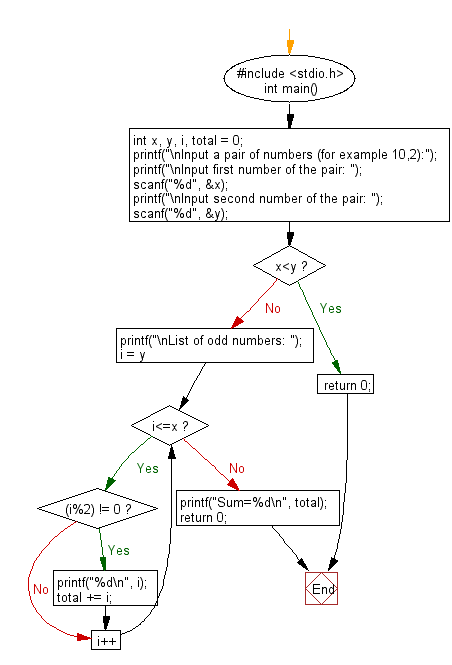Sum odd numbers between two given integers
Sum odd numbers between two given integers
Write a C program to compute the sum of consecutive odd numbers from a given pair of integers.
Sample Solution:
C Code:
#include <stdio.h>
int main() {
int x, y, i, total = 0; // Declare variables for user input and calculations
printf("\nInput a pair of numbers (for example 10,2):");
printf("\nInput first number of the pair: ");
scanf("%d", &x); // Read the first number
printf("\nInput second number of the pair: ");
scanf("%d", &y); // Read the second number
if (x < y) {
return 0; // If x is less than y, exit the program
}
printf("\nList of odd numbers: ");
for (i = y; i <= x; i++) {
if ((i % 2) != 0) {
printf("%d\n", i); // Print odd numbers within the range
total += i; // Add odd numbers to the total
}
}
printf("Sum=%d\n", total); // Print the total sum
return 0;
}
Sample Output:
Input a pair of numbers (for example 10,2):
Input first number of the pair: 10
Input second number of the pair: 2
List of odd numbers: 3
5
7
9
Sum=24
Flowchart:

For more Practice: Solve these Related Problems:
- Write a C program to sum all even numbers between two given integers.
- Write a C program to compute the sum of all multiples of a user-specified number between two integers.
- Write a C program to sum all prime numbers found between two given integers.
- Write a C program to calculate the sum of the squares of odd numbers between two provided integers.
Go to:
PREV : Find the highest value and its position from inputs.
NEXT : Check if a pair of numbers is in ascending/descending order.
C programming Code Editor:
Have another way to solve this solution? Contribute your code (and comments) through Disqus.
What is the difficulty level of this exercise?
Test your Programming skills with w3resource's quiz.
